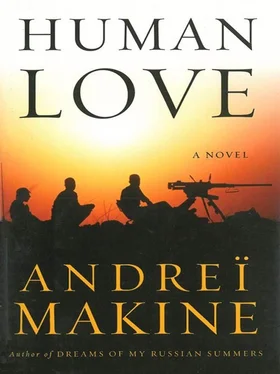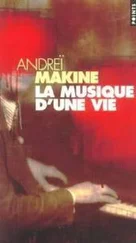There are a few loose ends, of no use to the specialists who will be writing it: that diamond merchant, his face crushed into a glittering mound of gemstones, and in a documentary film about the war between Ethiopia and Somalia, a sequence that probably passed unnoticed by the makers, a goat wounded by shrapnel thrashing about around its stake as the columns of victorious armored vehicles surge past.
All he had to counter to the insanity of this farce, in truth, was his love.
London. Postscript to history .
I saw him again in London, scarcely two years before the disappearance of the USSR, before the “end of history,” as proclaimed by a Japanese visionary, whom everyone took seriously at the time. It was the honeymoon between Russia and the West, a great “phew!” of relief at the grinning softness of the empire that, with Gorbachev, was learning to smile and calling this “democracy” For the first time, perhaps, I perceived in Elias’s words the sarcasm of a man betrayed. “You 11 see,” he had said. “You’re going to become best friends with the USA, ultra-obedient students of capitalism. When the USSR no longer exists…”
Such remarks seemed preposterous at the time. The empire had lost none of its power and was capable, as some years previously, of waging several wars at once, in Afghanistan, in Ethiopia, in Angola… Unwilling to contradict him for fear of upsetting the one within him whose life had been lived in the name of a dream, I adopted the somewhat condescending tone (I now realize) authorized by the crushing weight of our country when addressing our allies, the “auxiliaries” of the USSR’s messianic project. Half seriously and half in jest, I remarked that you can’t make a revolution “in kid gloves” and that history, as Lenin said, “is not the sidewalk on the Nevsky Prospekt.” I had heard these maxims tossed out like epigrams, from Elias’s own lips.
He seemed not to have heard me, his gaze suddenly fixed on what no one apart from himself could see. His voice became very calm, detached. “For such a dream of fraternity to succeed there would have to be people like Kar-bychev. Yes, there would have to be a faith that drives out the little buzzing insect within us, that little fly, the fear of dying. But, above all, we should have to know how to love. Just simply to love. Then it would be unthinkable for a woman thrown to the ground to have her collarbone smashed with the kick of a boot…”
I now remember clearly how on that night in London he told me about General Karbychev, the prisoner transformed by the Nazis into an ice statue. And I sensed then, as never before, the extent to which Elias was alone, as alone as a man upright beneath lashing cascades of water as they turn him into a block of ice.
What I had taken for a fanciful prophecy came to pass soon afterward: the empire closed down the war in Afghanistan, was beaten hollow at Mavinga in southern Angola, prepared pathetically to abandon Ethiopia… I ran into Elias in Luanda just after the defeat at Mavinga, where the Soviet instructors turned out to be such hopeless strategists. He was emerging from a hospital where he had been treated for a number of wounds on the arms and face. I was expecting some reference to his disagreement with the battle plan, the tactical intelligence the commanders had ignored… I imagined a bitter but also grievously triumphant tone, the attitude of one who had got it right and had not been listened to. None of that. He tightened the strip of bandages around his head, smiled at me: “I have the feeling they’re going to send us all to the Horn of Africa soon. Closer to the happier Arab lands. Look, IVe got my Lawrence of Arabia headdress on already. The war no longer makes any sense, you know. There are people fighting on both sides only interested in filling their own pockets. And, if they’re lucky one day having a dozen naked pianists on piano stools of their own. Ring down the curtain!”
When I found myself on Somali soil some months later, I did not even remember that prophetic joke. We no longer had time to recall the past: the hell of Mogadishu engulfed us in the violent and routine madness of fighting, in the recurring faces of the dead, among which only those of children could still shock us.
BEFORE ARRIVING IN MOGADISHU Elias had spent a week in Moscow, where he had seen Anna once more. He told me this in a couple of words on the telephone, just before I set off for Somalia myself. In the plane I imagined what their encounter might have been like, a Sunday in winter in a big Moscow apartment filled with objets d art accumulated during the couple’s tours abroad. As a result of working in Africa, Vadim must certainly have covered the walls in fantastic masks, spears whose shafts are decorated with bunches of sisal, shields of hippopotamus skin. And an array of figurines, mascots, and charms on every ledge. Now they’ll be able to add some of those curved daggers with jigsaw sheaths to them, I said to myself. The kind you get in the Horn of Africa…, visualizing this oppressive apartment with its thick carpets and massive furniture. Vadim had been working in Yemen. Then, after the start of the civil war there and the flight of the Soviets, they had sent him to Somalia. Anna had returned to Moscow to help their son, who was embarking on his university studies. She would soon be going to join her husband.
I believed I could not be much mistaken in picturing her with the features of a woman of forty, still beautiful, with a figure that had become more ample, more imposing. In other words, the solid wife of an apparatchik, intelligent and self-confident, aware of her success and of the exceptional comfort of this apartment where one winters day, without any special emotion, she awaited the visit of an Angolan friend, yes, an old friend from twenty years ago.
I pictured her thus, beautiful, calm, walking slowly through the rooms, adjusting a picture here, a mask there. And this calmness seemed to me to be the most grievous defeat to all that Elias had dreamed of.
Our plane, an army aircraft, had headed for Addis Ababa, from which some of us were due to fly on to Mogadishu. During these long flights I was accustomed to hearing animated debates among the soldiers, each one holding forth about “his” war in this or that country in the world. This time the dark cabin remained quiet. And when the occasional conversation developed, all it amounted to was mere scraps of voices, worn out with weariness and a shared awareness: it was time to pull out of all these quagmires of the “anti-imperialist struggle.’”
My neighbor was not even taking part in these terse exchanges; he was dozing, his ears blocked by the headphones of his tape recorder. His was an odd head: a very young face (he could hardly have been more than thirty) and completely white hair, that bluish, fragile white that very old men have. In the susurration of his headphones I identified a number of pieces following one another without any musical logic: the breathlessly tremulous “Petites Fleurs,” followed, who knows why, by Tchaikovsky’s “Valse Sentimentale,” which was encroached on by the breathy trilling of “Summertime,” and suddenly, after a screech that betrayed a recording from a disc, a classical fragment of wistful beauty, mingling violins and organ… I heard only the first few bars of it. My neighbor began twisting in his seat, rubbing his brow. By the glow of a small light, I could see his eyes glistening. His tape recorder was an old model, and at intervals the little cassette jammed – as it had now, since he had to take it out and adjust the tape by turning the spool with his finger. Incredulously, I saw that he was laughing softly and that his eyes were brimming with tears… He noticed my astonished glance, took off his headphones. “As soon as I stop the music I want to howl…” Not knowing how to respond to this admission, I gave a slight cough and murmured: “I see… Yes. It’s true. Music can…” But he was already talking, his eyes half closed, in the grip of a past that would not let him go. As an army doctor, he had been sent to Afghanistan at the age of twenty-six, quickly got used to restoring bodies riddled with shrapnel, repairing lacerated limbs, without any particular qualms, thanks to the indifference learned during his years as a medical student. Until that day, in the Baghlan mountains: a convoy of trucks with a tank at its head, children at the roadside laughing and waving their arms as the vehicles drove past. Invited on board by the tank crew, he is crammed into the smoke-filled turret where he can feel the force of this roaring mass of steel transmitted to his body, one that smashes through every obstacle with its tracks. This power has the effect of a fierce intoxication. He asks the driver for a light; the latter turns his head, offers him his lighter. The vehicle swerves off the road slightly, returns to it at once, but it is already too late. There is a grinding of brakes, and everything is mixed up: cold air rushing into the turret, the blinding sun, the shrill cries of the villagers, the cursing of the soldiers jumping to the ground… Then, despite all those sounds, silence falls. On the tanks tracks and under its tracks, a child’s body, crushed, hacked to pieces…
Читать дальше









